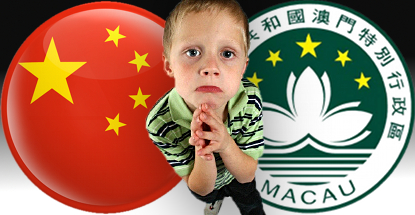 Academics in Macau are urging Beijing to legalize gambling on the Chinese mainland in order to prevent the loss of revenue to neighboring Asia-Pacific nations.
Academics in Macau are urging Beijing to legalize gambling on the Chinese mainland in order to prevent the loss of revenue to neighboring Asia-Pacific nations.
Two Macau-based academics – Macau Polytechnic Institute professor Li Sheng and Institute for Tourism Studies assistant professor Weibing Zhao – have published an article in which they argue that Macau’s gaming industry cannot hope to meet the demands of mainland Chinese gamblers.
The article, titled Strategic Destination Management in the Face of Foreign Competition, says Chinese citizens spend a total of around US $161b on gambling per year. Even before Macau’s gaming industry underwent its current revenue slump, its peak annual gaming revenue haul accounted for only about one-quarter of this total.
The academics say Macau’s inability to cope with this demand has led to the recent “mushrooming” of casinos across the Asia-Pacific region, “particularly near the Chinese border.” The article notes that many of these other jurisdictions “restrict or prohibit their citizens from entering casinos, showing an overt intention to earn money from foreigners,” with a clear preference for Chinese gamblers.
The academics argue that this “capital-exodus problem” poses “a real threat to national welfare.” Legalizing gambling on the Chinese mainland “would be strategically helpful in protecting China’s national economic interest.”
While Beijing has yet to show any inclination towards relaxing its mainland gambling prohibition, it has recently adopted a more defensive stance vis-à-vis other Asian casino markets targeting Chinese gamblers. In May, China warned Taiwan not to proceed with plans to develop casinos on Taiwan’s outlying islands or it would revoke the open trade policy currently enjoyed by China’s ‘renegade province.’
In February, a top official at the Ministry of Public Security warned other nations to stop luring Chinese citizens abroad for the purpose of gambling, leading to last month’s arrest of 14 South Koreans for allegedly facilitating travel to South Korean casino operators Paradise Co Ltd and Grand Korea Leisure.
The Macau academics acknowledge that ending the special administrative region’s monopoly on Chinese casinos would have its downsides. Macau would need some kind of protection from mainland competition, at least until it can diversify its economy and broaden its foreign visitor mix. The article suggests allowing Macau to continue its current role as a playground for VIP gamblers, while requiring the new facilities on the mainland to cater to the mass market gambling sector.






